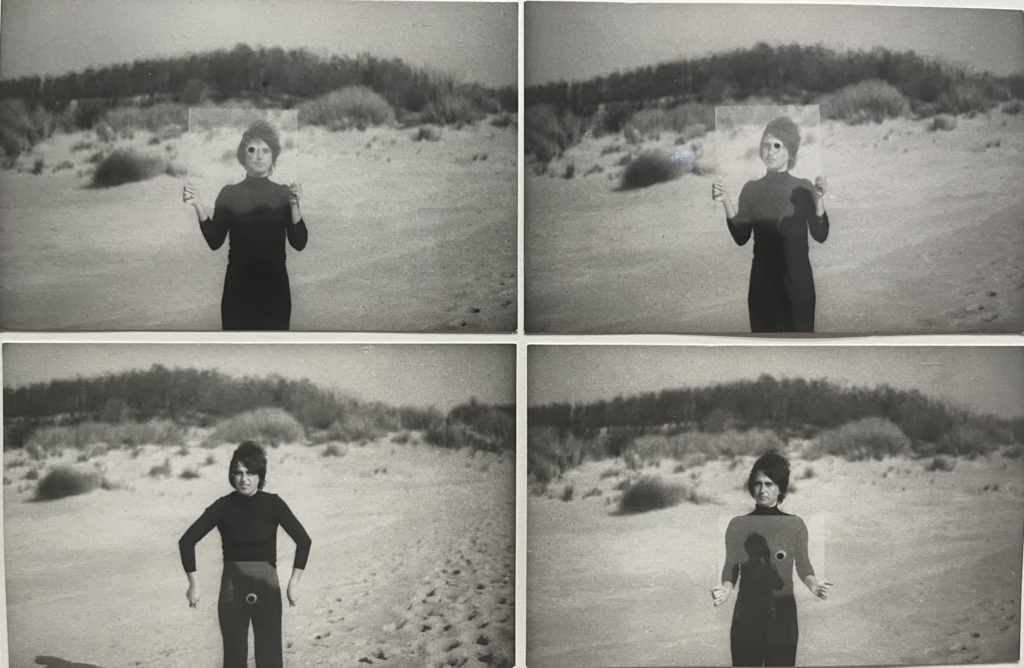
Specialization Module
Curatorial Design; Art Based Research
Rose-Anne Gush
REPRODUCTION AND ITS DISCONTENTS looked to the question of “reproduction” in feminist and media theory, exploring the performative, photographic and filmic work of artist VALIE EXPORT. This body of work formed a starting point and guide to question how reality is (re)produced within a complex discursive field made up of often fraught social relations. Photography’s history touches on both the changing contours of experience, and its enmeshment with technology, and how a photograph looks. Today, photography claims a paradoxical status. The proliferation of images and their transformation from analogue to digital technologies has led to its displacement by algorithm and data flow. Still, it maintains a representational hold on reality (Dewdney). Thinking with the architectural model of the camera obscura – as a model for the concept of ideology – we explored what might become possible if we shift our view. During the course, students also visited and worked with the VALIE EXPORT Centre in Linz.
Image: VALIE EXPORT, Glasplatte Mit Schuss, 1972
Excursion to Linz, November 2023
In November, our students had the pleasure of spending two days at The VALIE EXPORT Center for performance and media art, with Prof. Dr. Ulrike Hanstein and Dagmar Schink, who kindly and generously worked with us in the archive. VALIE EXPORT is an artist, writer and filmmaker who re-mediated “actionism”, re-producing and fixing her performances as videos and films. In her manifesto from 1980, using the format as a feminist corrective to Direct Art, she writes: ‘Feminist Actionism seeks to transform the object of male natural history, the material “woman” subjugated and enslaved by the male creator, into an independent actor and creator, subject of her own history’.** The aim of the centre is to make the premature legacy of VALIE EXPORT accessible for research. As an internationally oriented research center, it fosters artistic and scholarly engagement with media and performance art. On our excursion we explored the archive, learning how it works and what it makes available. We looked into EXPORT’s architectural models for her exhibitions, and we explored numerous artifacts, articles and documents that register her engagement with Unica Zürn’s House of Illnesses.
During the excursion we also visited Lentos Museum and ARS Electronica.
*Rose-Anne Gush, ‘VALIE EXPORT: Image and Body Space’, in Archives of Women Artists, Research and Exhibitions magazine, 2017, https://awarewomenartists.com/en/magazine/valie-export-image-espace-corps/. Accessed 10 January 2024
**VALIE EXPORT, ‘Aspects of Feminist Actionism’, New German Critique, No. 47, Spring-Summer 1989, pp. 69-92, p. 71.
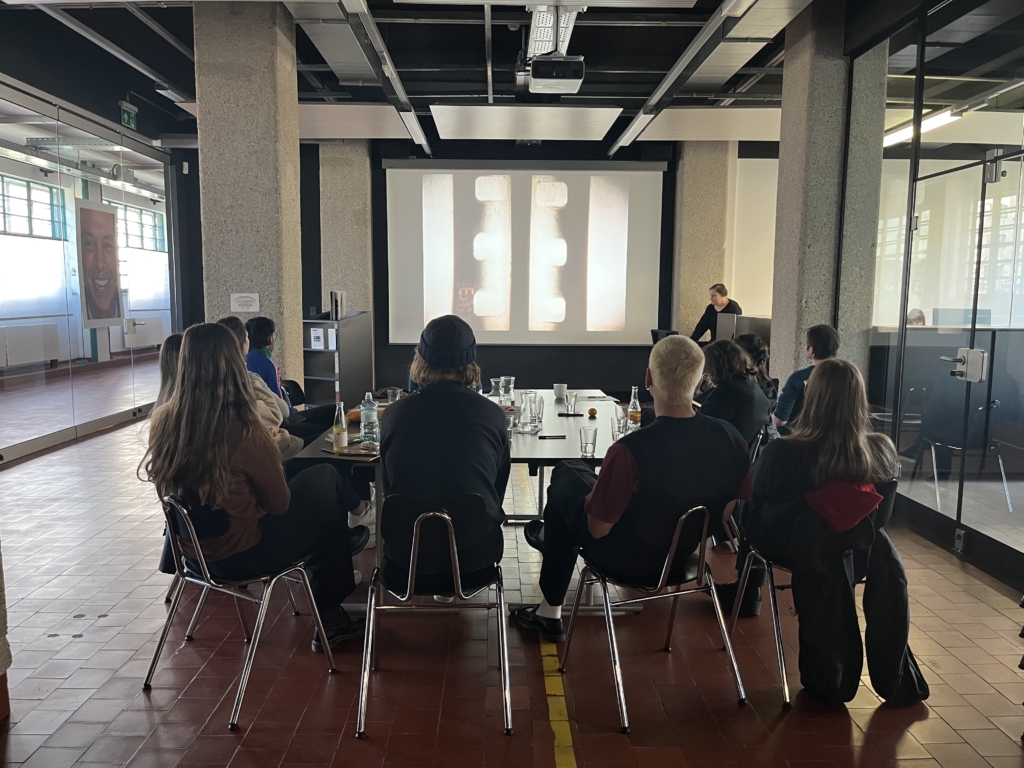
Image © Rose-Anne Gush
Marwa Arsanios, Guest Lecture and Workshop
In this discussion and screening session, Arsanios shared her research connected to the film, Who Is Afraid of Ideology? Part 4: Reverse Shot.
Her research moves between political questions regarding both the ways ideological mechanisms permeate land, space, time, systems of justice and subjecthood, and aesthetic thought that requires another kind of lens, an actual camera lens, a film set, a sound recorder and light. Arsanios seeks positions from which to read the land, places, legalities and subjecthoods.
Marwa Arsanios is an artist, filmmaker, and researcher who reconsiders mid-twentieth-century politics from a contemporary perspective. She looks at histories of resistances in their contemporary resonance. She has been working between different strands of New Materialism, historical materialism, postcolonial/decolonial theory and Marxist feminist politics. Arsanios approaches research collaboratively and seeks to work across disciplines. She is the co-founder of the Research Project 98weeks.

Film still from, Marwa Arsanios, Who Is Afraid of Ideology? Part 4: Reverse Shot, 2022, courtesy of the artist
Text, Marwa Arsanios, A Letter Inside a Letter: How Labor Appears and Disappears, excerpt
Blaise Kirschner, Guest Lecture and Workshop
In December 2023, students took part in a screening and workshop with Prof. Dr. Blaise Kirschner titled, In the rooms, corridors and streets of the body.
In My Death My Life by Pier Paolo Pasolini, Kathy Acker writes: “To substitute space for time. What’s this mean? I’m not talking about death. Death isn’t my province…Myself or any occurrence is a city through which I can wander if I stop judging.”
Acker’s substitution of space for time deborders the self and renders its anatomical arrangement (as body) into an architectural and social one (as city). Narration gives way to navigation, as the speaking self no longer moves through time, but through the spatialisation of its specific individuation. If this formulation seems abstract, then a drawing by Unica Zürn illustrates it concretely. Entitled “Plan of the House of Illnesses” it depicts Zürn’s body and its institutionalisation as one formation: a two-dimensional floor plan of a hospital, with its chambers and halls formed of body parts and organs, that both constitute and house the speaking self (alongside doctors, guards and enemies). Against a biocentric conception of the body as an organic and anatomically bounded entity, the “Plan of the House of Illnesses” thus offers a mapping of its biocultural emergence and antagonisms, incorporating elements that precede, coincide with, and exceed individual lifespans.
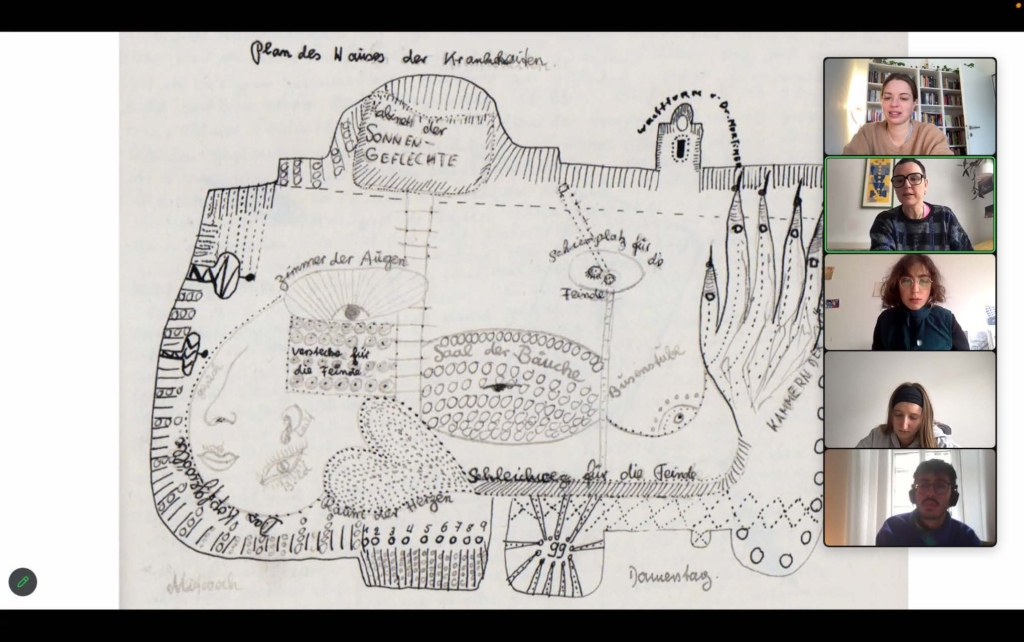
This course concluded with a one day exhibition with presentations at Forum Stadtpark.
23 January 2024
Guest critic: Andrea Popelka, curator, Kunsthalle Wien
With works by Hevala Acar / Andreea Calin / Anna Edelhofer / Mariá José Hernández / Katharina Klug / Tom Kohrs / Julian Lança Gil / Rey Monschein / Diana Nakhodkina / Zoe Petritz / Nicole Pühringer / Stefan Nikolas Schenkel Naranjo / Luca Tschernitz / Natalia Vasadze
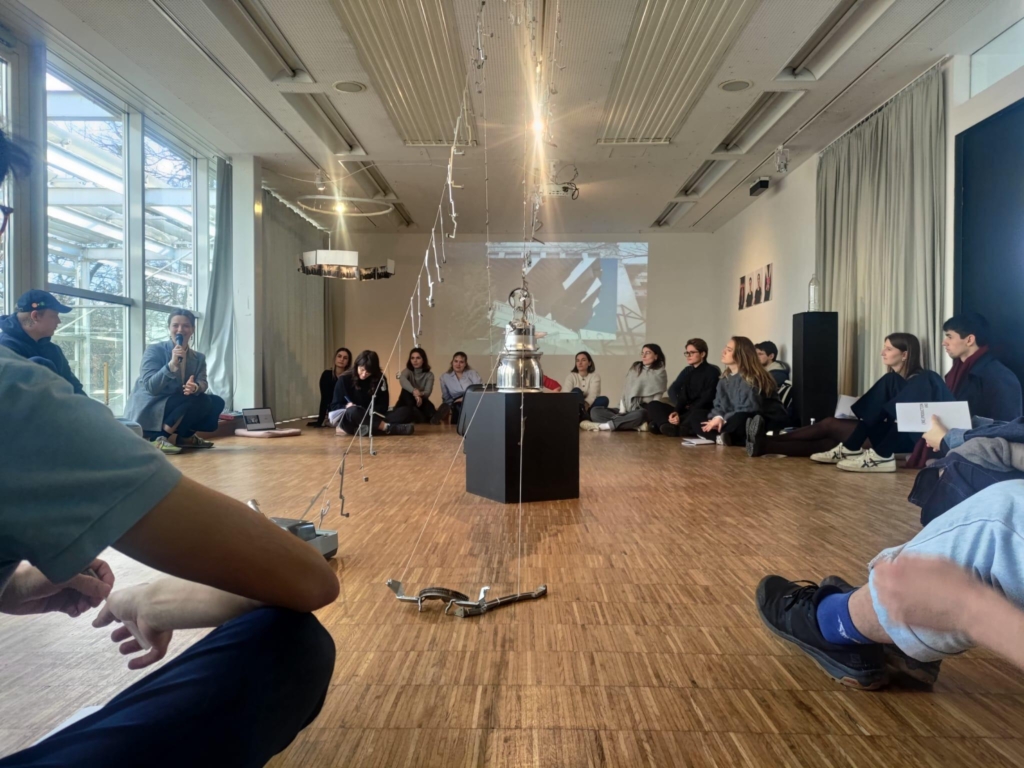
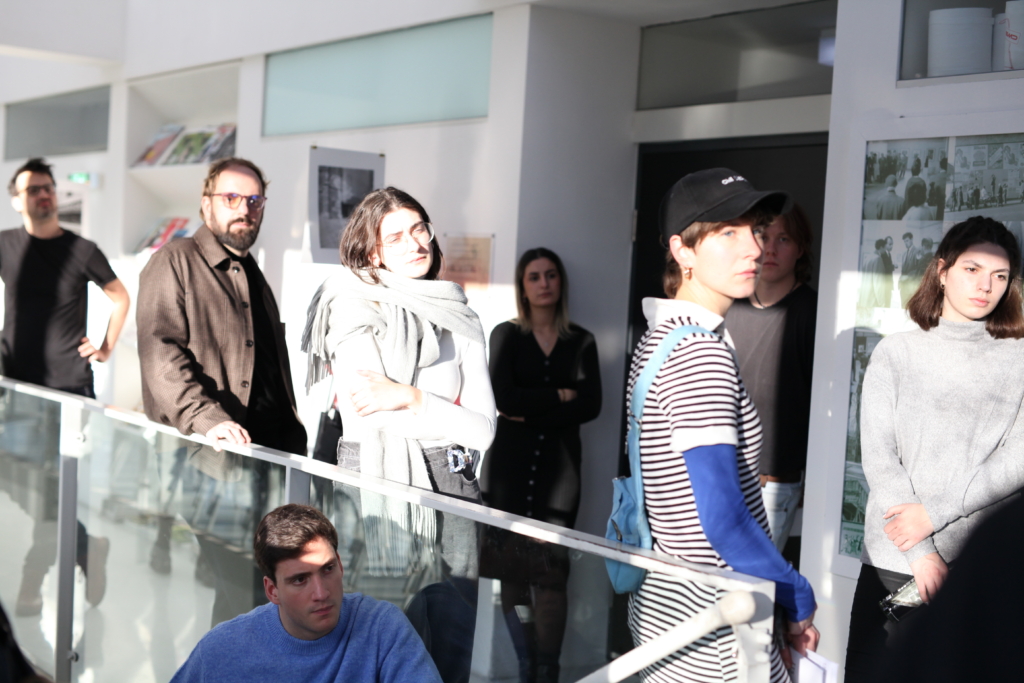
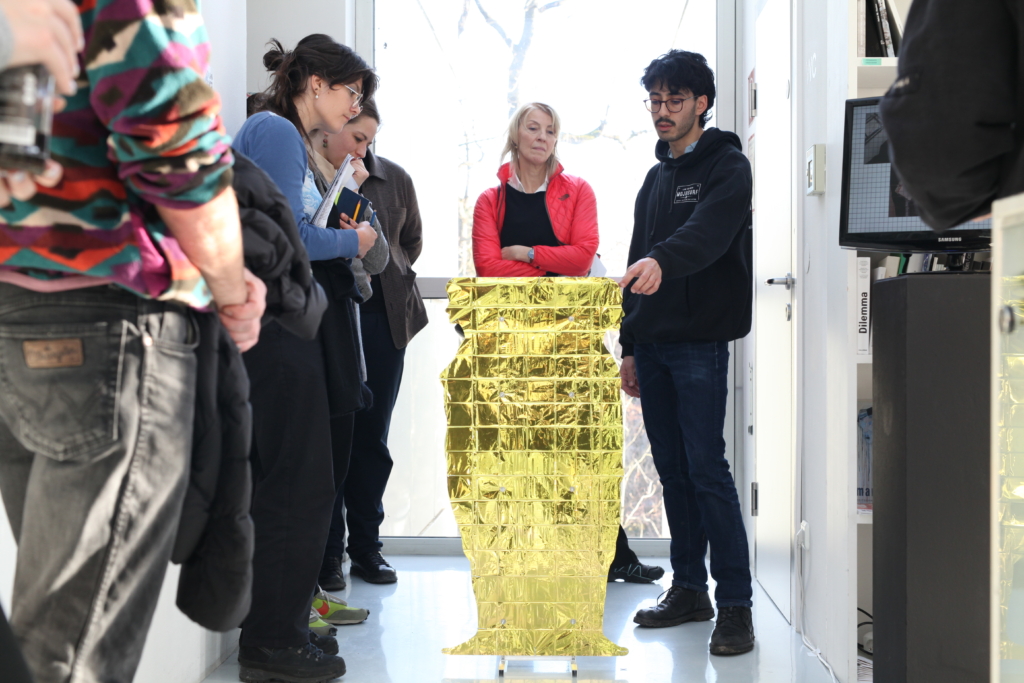
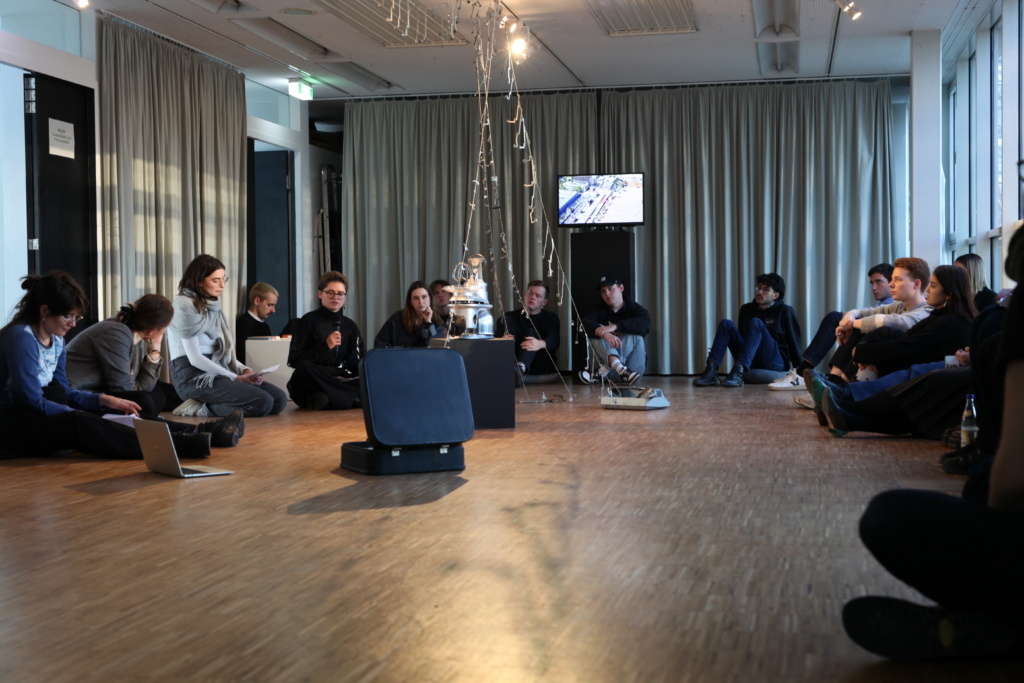
Image © Amel Bešlagić